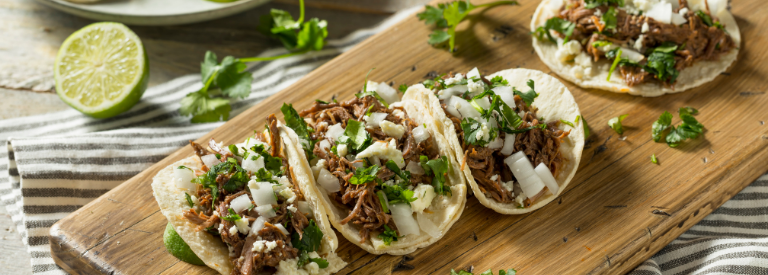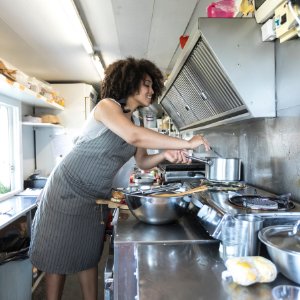Whether you own a food truck or concession trailer, you may be looking to expand your business. Tapping into the catering world provides your mobile business with the perfect opportunity to increase its profits. Hundreds of individuals in your area are likely hosting corporate or social events each week and many of them are looking to hire a catering company. In this detailed guide, we provide you with everything you need to do in order to start a mobile catering business.
Find A Location
Although your business is mobile, it’s important to decide on which areas you want to travel to. For example, if your company is based in Miami, Florida, do research on nearby cities and see if you’re interested in traveling to them for business. When researching, look into the paperwork required for your mobile catering business to operate in each city. If you find the process to be too difficult or your truck doesn’t meet the requirements, you may not want to do business there.
You should also consider the cost of gas to and from each location. You may charge $2,000 to provide food and drinks at a wedding. However, the cost of gas in addition to supplies and staff may not leave you with much of a profit. Conduct research on how much you would pay for gas to travel to each city and see if it’s worth it.
Once you know which locations you would like to provide your services in, include them in your website and social media pages. Providing individuals with these details will allow them to quickly identify if your business is a catering option for their event.
Obtain Necessary Permits & Insurances
When opening a catering food truck, you’ll need to obtain permits and licenses. The documents needed to cater and operate a food truck can vary from city to city. This makes it essential to contact the local government of each city you’d like to provide your services in.
If you begin to work events without all of the proper catering paperwork, you could be subject to fines and potentially lose your business. You may also not be able to work many events without documentation. The majority of event venues require caterers to submit their liability insurance, foodservice license, and other paperwork before being approved to cater an event. Without the proper food truck and catering documentation, you won’t be able to find much work.
Create A Catering Menu
If you’re starting a food truck catering business, you likely have in mind what type of food you’d like to specialize in. Feel free to get creative with menu items to expand the palettes of your clients and make your business stand out. When creating a menu for catered events, you should keep your business and clients in mind.

Make A Standard Menu
Similar to a sit-down restaurant, your mobile food business should have a standard menu. This menu should include all of the drinks, appetizers, entrees, side dishes, and desserts your business offers.
Your standard menu should also include at least a few catering menu packages. Each catering package should list the entrees or side dishes included in the package. For instance, if you’re operating a taco food truck, a catering menu package may include 2 chicken tacos with a side of rice and beans. Creating standard packages allows potential clients to gain an understanding of what your business can offer them.
Allow Clients To Customize Menus
You may have a list of catering packages available for your clients to choose from. However, a number of guests may have dietary restrictions or there isn’t a package that’s right for their event. Whether it’s during a call or on your website, inform customers that they have the ability to customize the menu. Allowing clients to pick and choose what is served from your original menu will make them happy and help increase business.
Decide On Catering Menu Prices
When setting catering prices, it’s essential to cover the cost of food, labor, time, and travel. The goal is to match your prices with the competition while providing you with a profit. Most caterers follow a fixed, tiered, or custom pricing system when quoting customers based on their event size and needs. If a client also requests a unique setup or cake cutting service, it’s important to inform clients of the additional fees you charge for those services. You don’t want to provide customers with any surprise fees on the day of the event. This can lead to poor online reviews and affect your business.
Purchase Food Truck Equipment & Supplies
When you purchase a food truck or concession trailer, many of them
already include cooking equipment. However, it’s important to furnish
your catering vehicle with the equipment and supplies that are essential
for your business. For instance, if your catering business specializes
in ice cream, you may want to replace the griddles in the truck with a
soft-serve ice cream maker. Equipping your truck with all the
necessities will allow you to efficiently and effectively serve your
clients. Below is a list of equipment and supplies your mobile catering
business may need to prepare food and serve orders:
Cooking & Holding Equipment
- Griddles
- Food warmers
- Fryers
- Microwaves
- Ranges
- Refrigeration
- Toasters
Food Prep Equipment
- Cutting boards
- Frying pans
- Food processors
- Gloves
- Knife racks
- Saucepans
- Thermometers
- Turners
- Worktables
Janitorial Equipment
- Broom and dustpan
- Cleaning chemicals
- Floor mats
- Mops
- Sinks
- Sponges
Serving Equipment
- Condiment cups
- Cups
- Food boats or plates
- Food wraps
- Napkins
- Sugar
- Spices
- Take out boxes
- Utensils
Hire A Catering Team
The size of your food truck will help determine the number of staff members you can hire. You want to hire enough caterers to quickly fulfill orders but don’t want to overcrowd your vehicle. The goal is to find a middle ground so your team can comfortably and efficiently complete tasks inside the truck. Many catering companies and food trucks give each staff member a variety of roles. This helps limit the number of employees needed inside the truck during events and on the payroll.
When assembling your catering team, you need to consider all the positions that need to be filled. There are a variety of roles that need to be filled in order to have a successful mobile catering business:
- Chef: The chef is in charge of prepping meals for each event. You will likely need multiple chefs on your team to prep meals in an orderly manner.
- Driver: This person is responsible for transporting the vehicle to and from events. Depending on the size of your vehicle, the person driving may need to have a commercial driver’s license.
- Event planner: The planner meets with clients to determine what they need for their event. Catering event planners are in charge of collecting information such as the guest count, meals served, type of event, and other important details.
- Server: Whether the service for the event is buffet-style or plated, a server is in charge of making sure everyone has food and drinks. A server will pass appetizers around to guests, refill buffet stations, or work the service window inside a food truck. You will need multiple servers for large events.
-
Supervisor: This person is in charge of overseeing
the entire operation. The supervisor makes sure that all tasks are
completed in a timely manner. Supervisors are also in charge of
handling any problems that may occur during the event.

Time To Open A Mobile Catering Business!
Opening up a mobile catering business isn’t as easy as it may sound. You need to obtain all the necessary documentation, create a catering menu, purchase kitchen equipment, and take care of other fine details along the way. While it may be challenging, following the steps in our detailed guide will help get started on the right track to open a successful catering business.






